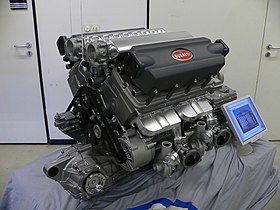Mechanical engineering is a discipline of engineering that applies the principles of physics and materials science for analysis, design, manufacturing, and maintenance of mechanical systems. It is the branch of engineering that involves the production and usage of heat and mechanical power for the design, production, and operation of machines and tools.[1] It is one of the oldest and broadest engineering disciplines.
The engineering field requires an understanding of core concepts including mechanics, kinematics, thermodynamics, materials science, and structural analysis. Mechanical engineers use these core principles along with tools like computer-aided engineering and product lifecycle management to design and analyzemanufacturing plants, industrial equipment and machinery, heating and cooling systems, transport systems, aircraft, watercraft, robotics, medical devices and more.
Mechanical engineering emerged as a field during the industrial revolution in Europe in the 18th century; however, its development can be traced back several thousand years around the world. Mechanical engineering science emerged in the 19th century as a result of developments in the field of physics. The field has continually evolved to incorporate advancements in technology, and mechanical engineers today are pursuing developments in such fields as composites,mechatronics, and nanotechnology. Mechanical engineering overlaps with aerospace engineering, civil engineering, electrical engineering, petroleum engineering, and chemical engineering to varying amounts.
Education
Degrees in mechanical engineering are offered at universities worldwide. In Brazil, Ireland, China, Greece, Turkey, North America, South Asia, and the United Kingdom, mechanical engineering programs typically take four to five years of study and result in a Bachelor of Science (B.Sc), Bachelor of Science Engineering (B.ScEng), Bachelor of Engineering (B.Eng), Bachelor of Technology (B.Tech), or Bachelor of Applied Science (B.A.Sc) degree, in or with emphasis in mechanical engineering. In Spain, Portugal and most of South America, where neither BSc nor BTech programs have been adopted, the formal name for the degree is "Mechanical Engineer", and the course work is based on five or six years of training. In Italy the course work is based on five years of training, but in order to qualify as an Engineer you have to pass a state exam at the end of the course.
In Australia, mechanical engineering degrees are awarded as Bachelor of Engineering (Mechanical). The degree takes four years of full time study to achieve. To ensure quality in engineering degrees, the Australian Institution of Engineers accredits engineering degrees awarded by Australian universities. Before the degree can be awarded, the student must complete at least 3 months of on the job work experience in an engineering firm.
In the United States, most undergraduate mechanical engineering programs are accredited by the Accreditation Board for Engineering and Technology (ABET) to ensure similar course requirements and standards among universities. The ABET web site lists 276 accredited mechanical engineering programs as of June 19, 2006.[9] Mechanical engineering programs in Canada are accredited by the Canadian Engineering Accreditation Board (CEAB),[10] and most other countries offering engineering degrees have similar accreditation societies.
Some mechanical engineers go on to pursue a postgraduate degree such as a Master of Engineering, Master of Technology, Master of Science, Master of Engineering Management (MEng.Mgt or MEM), a Doctor of Philosophy in engineering (EngD, PhD) or an engineer's degree. The master's and engineer's degrees may or may not include research. The Doctor of Philosophy includes a significant research component and is often viewed as the entry point to academia.[11] The Engineer's degree exists at a few institutions at an intermediate level between the master's degree and the doctorate
Coursework
Standards set by each country's accreditation society are intended to provide uniformity in fundamental subject material, promote competence among graduating engineers, and to maintain confidence in the engineering profession as a whole. Engineering programs in the U.S., for example, are required by ABET to show that their students can "work professionally in both thermal and mechanical systems areas."[12] The specific courses required to graduate, however, may differ from program to program. Universities and Institutes of technology will often combine multiple subjects into a single class or split a subject into multiple classes, depending on the faculty available and the university's major area(s) of research.
The fundamental subjects of mechanical engineering usually include:
- Statics and dynamics
- Strength of materials and solid mechanics
- Instrumentation and measurement
- Electrotechnology
- Electronics
- Thermodynamics, heat transfer, energy conversion, and HVAC
- Fluid mechanics and fluid dynamics
- Mechanism design (including kinematics and dynamics)
- Manufacturing engineering, technology, or processes
- Hydraulics and pneumatics
- Mathematics - in particular, calculus, differential equations, and linear algebra.
- Engineering design
- Product design
- Mechatronics and control theory
- Material Engineering
- Design engineering, Drafting, computer-aided design (CAD) (including solid modeling), and computer-aided manufacturing (CAM)[13][14]
Mechanical engineers are also expected to understand and be able to apply basic concepts from chemistry, physics, chemical engineering, civil engineering, and electrical engineering. Most mechanical engineering programs include multiple semesters of calculus, as well as advanced mathematical concepts including differential equations, partial differential equations, linear algebra, abstract algebra, and differential geometry, among others.
In addition to the core mechanical engineering curriculum, many mechanical engineering programs offer more specialized programs and classes, such as robotics, transport and logistics, cryogenics, fueltechnology, automotive engineering, biomechanics, vibration, optics and others, if a separate department does not exist for these subjects.[15]
Most mechanical engineering programs also require varying amounts of research or community projects to gain practical problem-solving experience. In the United States it is common for mechanical engineering students to complete one or more internships while studying, though this is not typically mandated by the university. Cooperative education is another option.
Salaries and workforce statistics
The total number of engineers employed in the U.S. in 2009 was roughly 1.6 million. Of these, 239,000 were mechanical engineers (14.9%), the second largest discipline by size behind civil (278,000). The total number of mechanical engineering jobs in 2009 was projected to grow 6% over the next decade, with average starting salaries being $58,800 with a bachelor's degree.[19] The median annual income of mechanical engineers in the U.S. workforce was roughly $74,900. This number was highest when working for the government ($86,250), and lowest in education ($63,050).[20]
In 2007, Canadian engineers made an average of CAD$29.83 per hour with 4% unemployed. The average for all occupations was $18.07 per hour with 7% unemployed. Twelve percent of these engineers were self-employed, and since 1997 the proportion of female engineers had risen to 6%.[21].



0 comments:
Post a Comment